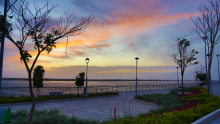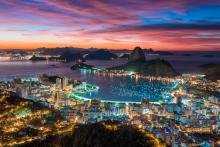In this new videoblog we talk to Carlos Lozada president of PANLAR, who discusses the challenges of leading during the covid-19 pandemic and what's to come for the onsite congress, as well as the future of the league.
EF: Hello everyone and welcome to a new Global Rheumatology videoblog where we will be discussing different topics. Today we are with Dr. Carlos Lozada to talk about what has been of PANLAR in these years and what is coming in PANLAR 2022.
CL: Thank you very much, Estefanía. And thank you for the work you all do at Global Rheumatology for our American rheumatology community and PANLAR.
EF: Dr. Tell us about your experience in the Presidency of PANLAR and how do you think everything will turn out in the next 6 months.
CL: Well, come on, a few years ago I couldn’t imagine that there were going to be such interesting years in my future. These almost two years have already been unique, the challenges have been substantial, starting with the pandemic, then the fact that at the same time I was appointed director of the division of rheumatology at the University of Miami. I had always been director of the training program, but in addition to that, I was directing the division.
So, there have been many challenges at the same time. There is also ILAR. The direction of ILAR rotates among the international organizations and PANLAR’s turn came last year, so I’ve been directing several entities, all at the same time.
What has helped is that in PANLAR we have a direction and a development plan that we have been following for some years now, and we have emphasized through the past two presidencies and mine the continuity and consistent direction of PANLAR, which is something that I hope will also be part of my legacy, as it is part of the legacy of at least the past two presidents, that is, a direction with a visible and consistent goal to reach.
EF: Dr. you mentioned the pandemic, what has been PANLAR’s biggest challenge facing this situation?
CL: The biggest challenge, not only for PANLAR, but for all medical and rheumatological organizations, has been the fact that part of our job is to build and maintain a community and make it grow, and certainly in the Americas we like to do that in person.
We all have learned a great deal. I think of how it's not necessarily face-to-face, communicating through blogs, video blogs, virtual meetings that we have multiple every day, and even now, that we are getting back to normal, four of my five days a week have been in person for some months now
We now have extraordinary communication skills, we can do meetings with people all over the world, plan them in 10 minutes if we have to. Thus, it has been a period of growth in spite of all those challenges, but I think it is also time now to get back to meeting in person and my idea from the presidency was to do a lot of meetings, create communities in all our PANLAR regions, but in person, and that has not happened. But I think we are about to take the first step in reestablishing normality, if we can say so, through our Congress coming in August.
EF: Did the roadmap you set out with PANLAR change at all, given the arrival of the pandemic?
CL: I think that, by force, the methods we have used to reach our goals have changed, technologies have been adapted and perhaps we have been having more meetings than we would have had, because it has become easier. But we have tried to maintain the goals and I think we have been successful in doing that. We have used different methods and newer methods, but the goal has remained the same and I think we are reaching the goals that we have set.
Certainly, one of the biggest ones was to establish a novel method of communication in PANLAR and in rheumatology and you are part of that, Global Rheumatology. Another goal we had was helping researchers in the areas of rheumatology and I think with the Research Unit which is still growing, we have been able to reach that goal that started just before my term as president, but it has certainly continued to grow despite the pandemic.
And then we have also set new goals, for example, one of my purposes and one of the things I wanted to do was to improve PANLAR’s support for rheumatology training programs across the Americas, we want to improve rheumatology patient care, access and well, it is essential to have rheumatologists for that and I think we all agree that there is actually a deficit of rheumatologists across the world, and the Americas is no exception to that rule. We are heading to start a program this year to support training programs across the Americas, by providing resources to create new training positions and, again, it is just starting, but the idea is that it keeps on growing and PANLAR will play an important role for increasing and improving access to rheumatology not only through our courses, our efforts with patients, but also, helping to train rheumatologists.
EF: What do we expect for this year Congress?
CL: It has not been easy, but we have decided to go with an on-site congress. In fact, it is going to be the first major Congress, at regional and global level, that is going to be held on-site, at least in our continent. And this involves a number of variables, because no one has been doing it for the past two years. From estimating the attendance, the space, what kind of activities can or cannot be done.
Trying to predict how is it going to be with the pandemic issue. Although, at least here in the United States and in Florida, we have been improving in terms of the activities that can be done, sporting events have been taking place in-person and without restrictions for some time now. I think we are well on our way to getting close to normal.
And I think it was time to do it, if EULAR and ACR don’t do it then PANLAR has to do it, there is nothing wrong with pioneering that, and I think we will be pioneers in terms of getting back to the on-site Congresses. And I think it is very important to do it because our members and our community prefer face-to-face over virtual interactions.
EF: What will be the approaches you will have now, also considering the changes that had to be made according to biosecurity because we are still in this transition from virtual to face-to-face?
CL: Of course, it involves trips and other activities, and we are trying to follow all the recommendations. Here in the United States, they are more permissive in terms of these events being held on-site. Here in Florida, facemasks are no longer required in restaurants nor in events, but there is nothing wrong in wearing them. Whoever wants to do it and take extra precautions, and, of course, all the biosecurity measures required will be applied, all the things we have learned in these last two years and that should apply at any time, not only in times of pandemic.
Yesterday I took a flight, and facemasks are still required for flights here in the United States but may not be required in a couple of weeks. To me, it doesn’t seem like a bad idea, considering that there is always someone around you coughing on an airplane. Maybe at any given time it is a good idea to wear this mask for those couple of hours despite the inconvenience.
EF: What has been that differential factor and that plus that PANLAR has had in recent years?
CL: Well, I don't know if I understand the question. Do you want me to take any particular approach?
EF: Anything you consider important to share with us
CL: If we want to keep on talking about what has changed and what we have put effort into changing I don't think this is so much about the pandemic, I think these two changes are changes that have been very important in terms of the future of our organization and would be important for any organization these days.
We have been looking to increase the number of volunteers engaged in PANLAR community and I think we have been successful on doing so; we have also created an event committee within PANLAR, so that it is not the Executive Committee or the Board of Directors that has to organize the events. The organizing committee is going to rotate every few years, but every year it is going to have some new members and retain some of its old members. We have tried that committee to be diverse, representing PANLAR, not just in regional terms, since PANLAR has always been effective and good in terms of regional diversity, but in terms of gender diversity.
We have had a great participation of people who perhaps before had not had such important positions within PANLAR, but now, in a certain way, we have grown our group, not only of volunteers, but of leaders. And in the last three PANLAR congresses our president of the organizing committee or the president of the congress organization have been women, and so I think that is a very, very important step forward. Not only to have more volunteers and to have diversity of age, which we have always had, and diversity of regions, which we have always had, but also to have that gender diversity.
The reality is that rheumatology is evolving into a specialty where, at least here in the United States and in many parts of the Americas, the majority of doctors are women. So, we have to be representative of that, and if we are not, then we are hurting the organization and the ideas and the new initiatives that would come from that group and we would not have other way to have them.
EF: What regional challenges do you think we face?
CL: A major challenge that has always been there, and I think it continues in this time of pandemic and economic uncertainty, unfortunately recently we have that too, the post pandemic period let's say, is that we don't always have all the resources that we would like to have. And we don't always have the same support in terms of educational activity, etcetera, from the industry that they would have in Europe, for example, or in North America. So, this is a challenge that I believe will continue and the next president will have to continue the effort so that the support for Latin American rheumatology does not necessarily come from the regional offices alone, but rather from the global office of Pharma, for example, which is where there is an immense number of resources and where the ACR or EULAR meetings are supported.
I think that holding an annual congress and making it big and doing it on-site as we are doing helps us to increase that visibility and to obtain the greatest possible support from where the resources exist to support education, to support science, which in reality, of course doctors are supporting us, patients are supporting us, but in reality, we also need the pharmaceutical industry to support us to a greater and greater degree.
EF: Dr. Thank you very much for your time and for participating in the Global Rheumatology video blog.
CL: Thank you very much, Estefanía, and thanks to Global Rheumatology. It is always a pleasure to be with you.







